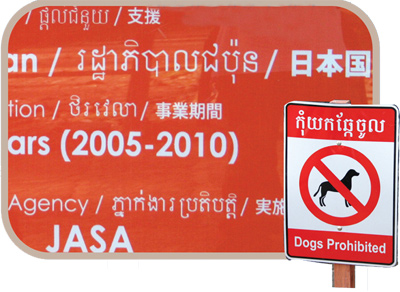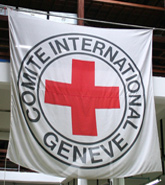
|
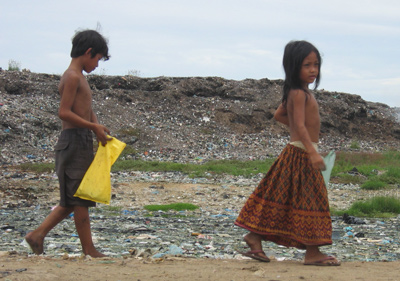 |
| |
A Passage To Cambodia
Thoughts and Impressions
|
What is the impact of globalisation on developing countries? To find the best answer, you certainly cannot rely on TV or the Internet alone. Instead you can pack your bags and go see it for yourself. Cambodia, formerly known as Kampuchea, is a country that is rarely visited by the people of Hong Kong. It is a country plagued by images of innumerable helpless faces and the tragic accusations of landmine victims. Once a wasteland where visitors feared to tread, who would want to visit a country notorious for its reign of terror under the Khmer Rouge?
The answer is Mr Chor Tai-wai, HKIEd's Student Affairs Officer and 20 student-teachers majoring in different disciplines, who took part in Project Infinite, an international humanitarian service trip. The eight-day trip to Cambodia certainly left project participants with a great deal of food for thought. |
Project Organiser:
The Student Affairs Office, HKIEd
|
| Project Themes: |
| ¡E |
to study the impact of globalisation on developing countries |
| ¡E |
to enhance the understanding and concern of project participants on the social issues of the country under study |
| ¡E |
to take part in international humanitarian services |
|
Project Co-organiser:
The Hong Kong Red Cross
|
Project Name:
Project Infinite - International Humanitarian Service Trip |

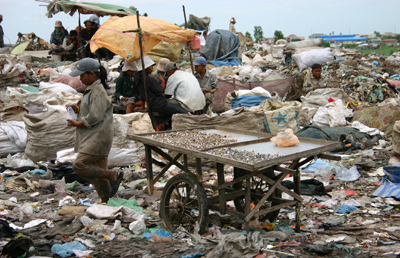
| "Treasure Island" |
It is literally a hill of garbage. Nevertheless, it is also a treasure trove for the local population because of the "business opportunities" hidden in the piles of rubbish. The sad reality is that however hard a family might struggle to divide their labours on this "Treasure Island", the daily take-home pay comes to no more than US$1. Another famous side product of the garbage dump, are the many hawker stalls in the area selling braised snails. This could perhaps be described as a new service industry arising from the "treasure-hunting" activities. |

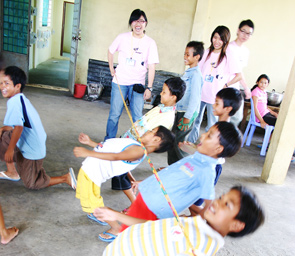 |
| Games a Remedy |
This orphanage might look cold from the outside but it was filled with warmth and care inside. Playing with a makeshift rope made of rubber-bands, the children were so engrossed in their game that they had no time to think about where they were from. Words were unnecessary for comm-unication. There was hearty laughter and loud cheers all around. Perhaps it was care and acceptance, rather than sympathy, that these children needed most. HKIEd's future teachers were able to offer exactly that. |
|

| Globalisation |
| Street signs bearing information in Khmer, English, Chinese and Japanese were found everywhere in Siem Reap. Gangs of children kept trying to sell souvenirs to our team members using their limited English and Putonghua. Globalisation has obviously not brought any culture shock problems to the Cambodians. Nor did they seem to mind that no one was using their mother tongue. |


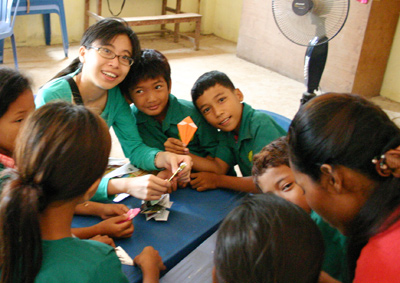
| Paper Folding |
Entertaining children with paper folding activities was an item on the itinerary. Since not all the HKIEd team knew how to conduct this activity, they divided themselves into groups of five to undergo a crash course at the hotel. The "results" were amazing - there were lilies, frogs, hearts and even jumping spiders.
|
Arriving at the Emmanuel Christian School, which used to be a deserted factory, the team soon found that they did not need any paper folding activities to establish a relationship with the children - just holding their little hands helped to make them feel that they were being cared for. No one cared whether the paper spiders could jump or not. |

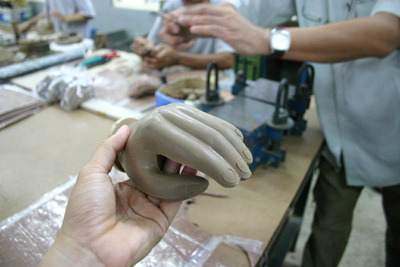 |
|
Helping Hands
The Red Cross flag was flying high outside its Cambodian workshop. When the team went inside, they found a vast array of models and tools for the manufacturing of artificial limbs. The workers were paying careful attention to every detail of their work and they were keen to explain the exact functions of the various products. Although the Khmer Rouge atrocities took place some time ago, their horrendous consequences can still be seen today - there are more than 800 landmine victims who queue for help every year in Cambodia. Seeking to alleviate the problem, the Red Cross set up a workshop in the country to manufacture artificial limbs, which are then given free to the local population. These artificial limbs may look like toys at first glance; but the stories behind them are enough to send chills down anyone's spine.
|

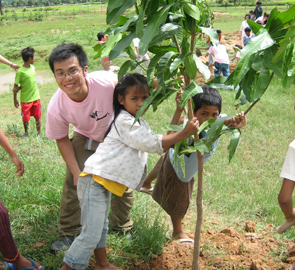 |
| Seeds of Expectation |
The HKIEd delegation bought ten mango seedlings for the orphanage and together with the children, planted them outside the compound. The hope is that these seedlings will grow rapidly, bearing fruit in a couple of years* time. The trees will also provide shade against the scorching heat that can reach 40¢J in the orphanage's surroundings. Education is similar to the planting of trees. Both take a long time for the work to bear fruit. Our student-teachers probably had the same thought in mind when they planted those seedlings. |
|

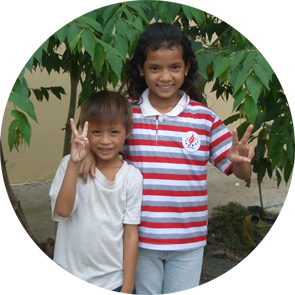 |
Behind the Laughter and the Cheers
Many children in the orphanage appeared "hip" because they looked as if their hair had been dyed blonde. The truth however, as the officers there explained, was that these children came from the "Garbage Dump". They were actually suffering from chronic mal-nutrition which causes the yellowish tinge in their hair. Additionally, many young girls from the poor districts were being sold by their parents as prostitutes. Other parents refused to let their children stay in the orphanage, for fear of losing the bread winners" in their families. Listening to these tragic stories, the team were devastated to hear just how much these poor children had suffered before they came to live at the orphanage.
|


| Live and Let Live |
While touring the World Heritage site of Angkor Wat, the team came across a young mother and her son playing on the sandy ground. The toddler did not have any trousers on. When he fell over, his mother did not seem to be too bothered. She obviously expected him stand up on his own again if he wanted to go on playing. The ability to grow in independence and to get up again is inherent in man. |
The above stories and pictures were kindly supplied by HKIEd students Connie Choi Man-wah, Terry Lee Wai-kit, Maxwell Ho Chun-sing, Wong Kwok-wai, Wong Man-yan and Student Affairs Officer Mr Chor Tai-wai. |
|
|



